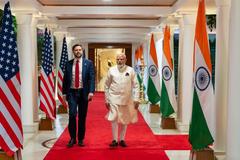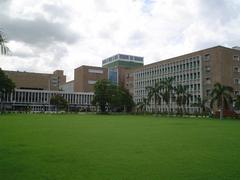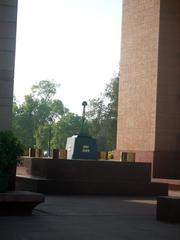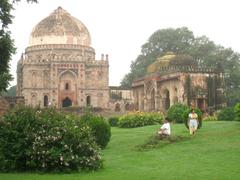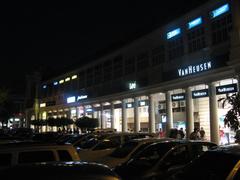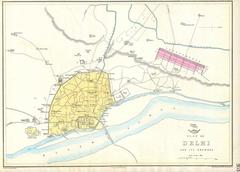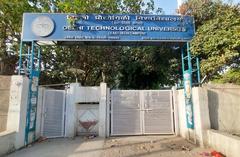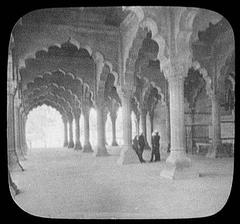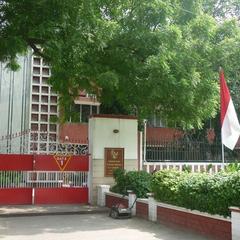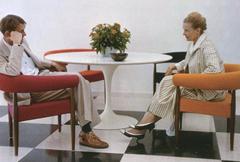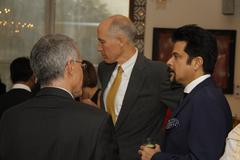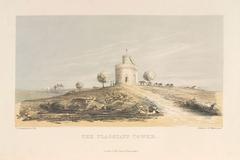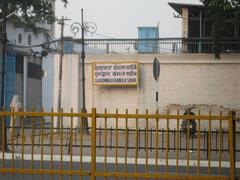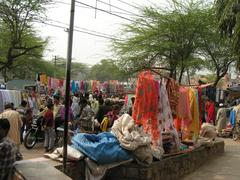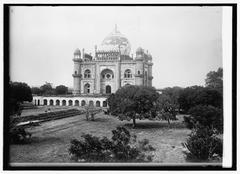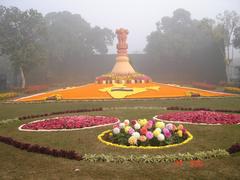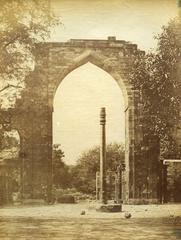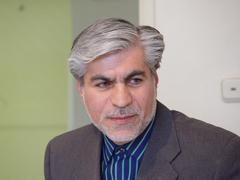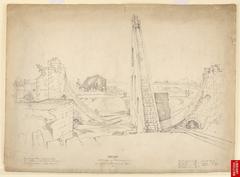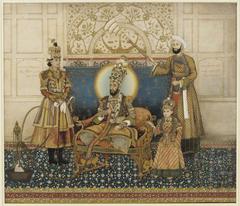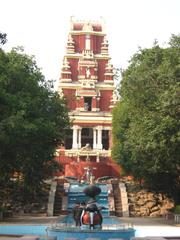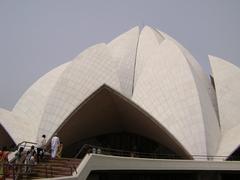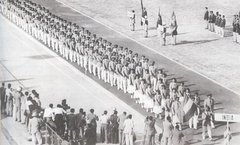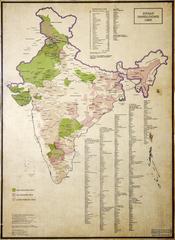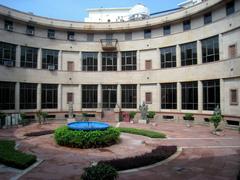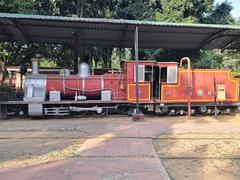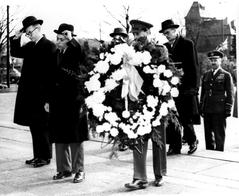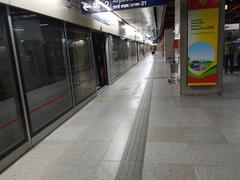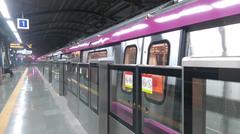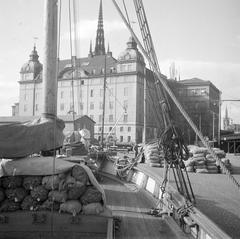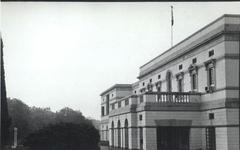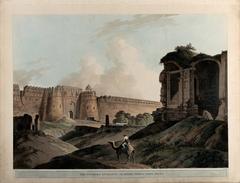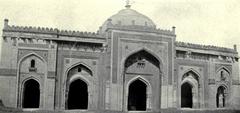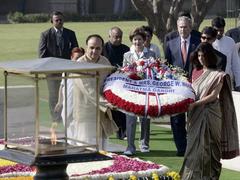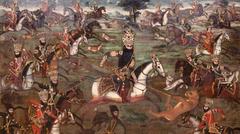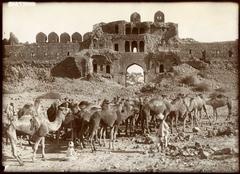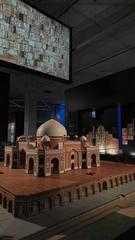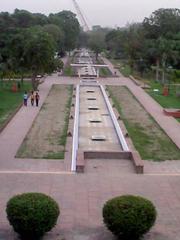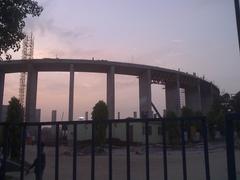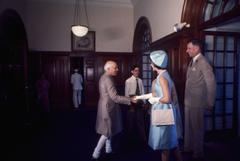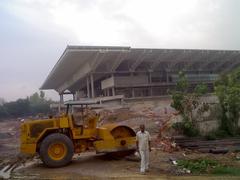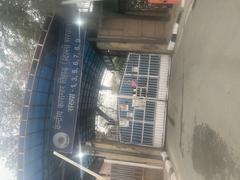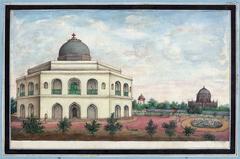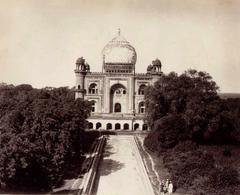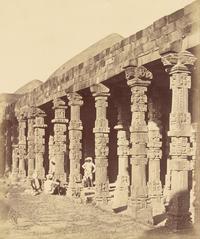Embassy of France in New Delhi: Visiting Hours, Tickets, and Visitor Information
Date: 15/06/2025
Introduction
The Embassy of France in New Delhi is a distinguished representation of the longstanding diplomatic, cultural, and historical ties between France and India. Established shortly after India’s independence in 1947, the embassy has played a crucial role in deepening bilateral relations, fostering diplomatic exchanges, and promoting cultural cooperation. Located in Chanakyapuri, New Delhi’s diplomatic enclave, the French Embassy stands out not only for its political significance but also as an architectural landmark. Its modernist design, climate-responsive elements, and integration of French and Indian sensibilities make it a notable example of international diplomatic architecture.
This detailed guide provides a comprehensive overview of the embassy’s history, architecture, strategic importance, and visitor logistics. Whether you are interested in Franco-Indian relations, architectural heritage, or consular services, this article will help you plan and enrich your visit to the French Embassy in New Delhi. For official updates and detailed information, refer to the embassy’s website and affiliated portals (French Embassy India; France-Visas portal).
Table of Contents
- Introduction
- Historical Evolution of the French Embassy in New Delhi
- Architectural Features and Influences
- Notable Architectural and Security Features
- Renovations and Contemporary Developments
- Symbolism and Cultural Significance
- Visitor Information: Hours, Entry, and Accessibility
- Nearby Attractions and Cultural Engagement
- French Embassy New Delhi: Visa Application, Consular Services, and Appointments
- Frequently Asked Questions (FAQ)
- Conclusion
- References and Official Links
Historical Evolution of the French Embassy in New Delhi
Early Diplomatic Relations and Establishment
France and India established formal diplomatic relations soon after India’s independence in 1947. The French Embassy quickly became a vital channel for engagement, reflecting the significance of the bilateral partnership. Its location in Chanakyapuri, developed during the 1950s and 1960s as New Delhi’s diplomatic district, underscores the importance both nations place on their relationship (EmbassyPages).
Architectural Features and Influences
Main Chancery and Diplomatic Compound
The embassy complex, located at 2/50-E Shantipath, Chanakyapuri, embodies modernist French architectural ideals adapted to Indian climatic and cultural contexts. The compound is functional, secure, and representative of France’s cultural identity, balancing the requirements of diplomatic activity with architectural elegance (Embassies.net).
Raj Rewal’s Staff Quarters
Renowned Indian architect Raj Rewal designed the staff quarters between 1968 and 1969, prioritizing privacy, natural ventilation, and the use of local materials. These quarters feature private courtyards, roof terraces, and open staircases, thoughtfully responding to New Delhi’s climate and fostering a sense of community and comfort (Scribd).
Integration within Chanakyapuri
The embassy is part of the 28-acre Chanakyapuri diplomatic campus, surrounded by other major foreign missions. The district itself reflects Nehruvian principles of openness and internationalism, and the French Embassy stands out for its modernist design and contextual adaptation (ArchDaily).
Notable Architectural and Security Features
- Modernist Aesthetics: Clean lines, geometric forms, and the use of materials like brick and concrete define the embassy’s style.
- Climate-Responsive Design: Passive strategies such as open courtyards, natural ventilation, shaded walkways, and building orientation reduce solar heat and promote comfort (Scribd; ArchDaily).
- Security and Accessibility: The embassy maintains robust security protocols with controlled entry points, while ensuring accessibility for visitors, including those with disabilities (EmbassyPages).
Renovations and Contemporary Developments
Ongoing restoration efforts preserve the embassy’s architectural heritage, including original features like breeze blocks and reflecting pools, while upgrading security and operational infrastructure. The main building holds landmark status, and plans are underway to repurpose older structures for less sensitive functions (NY Post).
Symbolism and Cultural Significance
The embassy is a dynamic venue for cultural exchange, hosting events, exhibitions, and educational programs that promote the French language and celebrate Indo-French collaboration. Its architectural design itself stands as a symbol of mutual respect, dialogue, and the blending of two cultures (in.ambafrance.org).
Visitor Information: Hours, Entry, and Accessibility
Address: 2/50-E Shantipath, Chanakyapuri, New Delhi 110021
Phone: +91 11 4319 6100
Website: French Embassy in India
Visiting Hours
- General Visitors: Monday to Friday, 9:30 AM to 12:30 PM and 2:00 PM to 4:30 PM
- Consular Services: Monday to Friday, 9:30 AM to 1:00 PM (by appointment only)
- The embassy is closed on French and Indian public holidays.
Note: All visits require a prior appointment. Casual visits or tours are not permitted due to security protocols.
Entry and Tickets
- Public access is limited to those with confirmed appointments (for consular, visa, or official business).
- There are no tickets or public tours.
- Carry a government-issued photo ID and appointment confirmation.
- Security screening is mandatory; electronic devices and large bags may be restricted.
Accessibility
- The embassy provides facilities for differently-abled visitors, including ramps and accessible restrooms.
- Notify staff in advance if you require special assistance.
Nearby Attractions and Cultural Engagement
Nearby Historical and Cultural Sites
- India Gate: Iconic war memorial, approx. 2 km away
- Rashtrapati Bhavan: Presidential residence and gardens
- Humayun’s Tomb: UNESCO World Heritage site, about 5 km away
- Lodhi Gardens: Historic park, 4 km from the embassy
- National Gallery of Modern Art: Art museum, 3 km away
Alliance Française de Delhi
Located in Lodhi Estate, Alliance Française is the embassy’s key partner for cultural and language outreach, offering:
- French language courses
- Weekly film screenings, art exhibitions, and lectures
- Library and café access
- Special events like Francophonie Festival and Bastille Day celebrations
Cultural events are often open to the public or require advance registration (Alliance Française India).
French Embassy New Delhi: Visa Application, Consular Services, and Appointments
How to Schedule a Visa Appointment
- Book online via the France-Visas portal or VFS Global.
- Early booking is recommended, especially during peak seasons.
Consular Services
- Passport issuance and renewal for French nationals
- Registration of births, marriages, and deaths
- Notarial and legalization services
- Emergency assistance (e.g., lost passports)
- Information on studying in France and scholarships (Consular Section)
Visa Application Process
- Complete your visa application on France-Visas.
- Prepare required documentation (passport, photos, travel itinerary, financial proof, insurance, etc.).
- Book and attend your appointment at a VFS Global center.
- Submit documents and biometrics in person.
- Track the status of your application online.
Visa Fees (as of June 2025)
| Visa Type | Fee (EUR) | Approx. INR | Additional Charges |
|---|---|---|---|
| Short-Stay Schengen Visa | 80 | 7,200 | VFS Service Fee: INR 1,500 |
| Children (6-12 years) | 40 | 3,600 | |
| Long-Stay Visa | 99 | 8,900 |
Fee waivers are available for certain categories such as students and young children (France-Visas Fees).
Frequently Asked Questions (FAQ)
Q: What are the French Embassy New Delhi visiting hours?
A: Monday to Friday, 9:30 AM to 12:30 PM and 2:00 PM to 4:30 PM for general inquiries; consular services are by appointment.
Q: How do I book an appointment?
A: Use the France-Visas portal or VFS Global.
Q: Are walk-in visitors allowed?
A: No, all visits require prior appointments.
Q: Is the embassy accessible to differently-abled visitors?
A: Yes, facilities are available; inform the embassy in advance if special assistance is needed.
Q: Can I attend cultural events at the embassy?
A: Some events are open to the public or by registration; check the embassy’s website for updates.
Q: What documents do I need for a visa application?
A: Requirements vary; generally, you need a completed form, passport, photos, travel and financial documents.
Conclusion
The French Embassy in New Delhi stands as a vibrant testament to the enduring partnership between France and India. Its climate-sensitive, modernist design, strategic location, and rich program of cultural events reflect the depth of bilateral ties. Visitors are encouraged to plan their visits with prior appointments, consult official resources for the latest information, and take advantage of nearby cultural and historical sites for a comprehensive experience. For up-to-date details, visit the official embassy website or utilize the France-Visas portal.
References and Official Links
- French Embassy India
- France-Visas portal
- VFS Global India - France Visa
- EmbassyPages
- ArchDaily
- Scribd
- NY Post
- MEA Bilateral Brief
- Consular Section
- Alliance Française India
